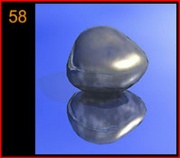Cerium
Description
A rare earth element. Cerium has an abundance in the earth's crust of 46 ppm. It is found in the minerals cerite, bastnasite, and monazite. It was discovered in 1803 by Baron Berzelius, a Swedish chemist. Cerium is a gray ductile metal that is very reactive. It is used in metal alloys to increase creep resistance, and add strength. It also serves as a getter to remove traces of oxygen. Ceric oxide is used as an abrasive, catalyst, and as an ingredient in glass and glazes.
Synonyms and Related Terms
Ce
Other Properties
Attacked by mineral acids and alkalis. Oxidizes in moist air.
| Composition | Ce (atomic no. 58) |
|---|---|
| CAS | 7440-45-1 |
| Melting Point | 798 |
| Density | 6.770 |
| Molecular Weight | atomic wt. = 140.115 |
| Boiling Point | 3433 |
Hazards and Safety
Powder may ignite spontaneously.
Fisher Scientific: MSDS
Authority
- Van Nostrand's Scientific Encyclopedia, Douglas M. Considine (ed.), Van Nostrand Reinhold, New York, 1976
- Random House, Webster's Encyclopedic Unabridged Dictionary of the English Language, Grammercy Book, New York, 1997
- The Merck Index, Martha Windholz (ed.), Merck Research Labs, Rahway NJ, 10th edition, 1983 Comment: entry 2037
- The American Heritage Dictionary or Encarta, via Microsoft Bookshelf 98, Microsoft Corp., 1998
